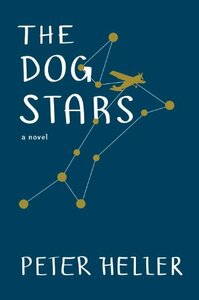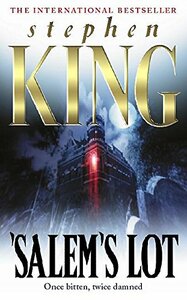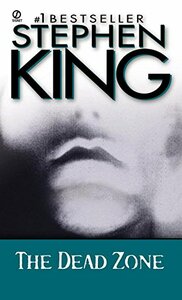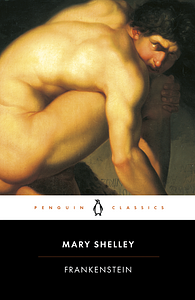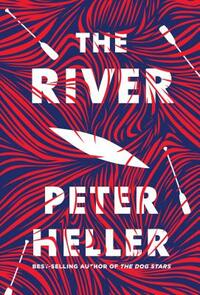Take a photo of a barcode or cover
the_grimm_reader's Reviews (242)
I love visiting my local bookstore and searching through the discounted books for random reads. This book, Dead By Dawn, had a striking cover so I read the synopsis—it sounded like something I’d enjoy, so I picked it up. This book features Maine Game Warden Mike Bowditch—apparently this is book twelve in the series. Page one of this book is all gas—no brakes (no pun intended). From the jump, you’re immediately immersed in Warden Bowditch’s fight for his life in an icy river. Author Paul Doiron does a wonderful job of putting you right inside the action and anxiety. My mental images were popping off in rapid fire, as Bowditch’s situation moves from bad to totally f*cked! I like the character—he’s not your typical action hero who has every survival or tactical skill mastered, and in this story he’s quite often robbed of the resources many action heroes rely on—he just has to keep going and make due with what he can get his hands on, and those resources often suck. As swiftly as Doiron put you in the dire straights, he pulls you out again in alternating chapters, revealing the details of Bowditch’s investigation that chapter-by-chapter, ultimately brings the story to n intense and satisfying conclusion. One minute you’re fighting with Mike for his life, the next you’re following the clues of the investigation, knowing they will ultimately lead to Mike’s crash into the frozen waters. I liked the world, the characters, the hero, and the villains. When I picked this up I had no idea it was a series, so I plan to rewind and start with book one—The Poacher’s Son—and follow Mike Bowditch on more of his cases. I’m not sure what this genre is, but I like it. In the surface I’d say it’s a thriller, but it fits into the “nature crime” space of other books I’ve read by Peter Heller, Kimi Cunningham Grant, and Alice Henderson. There’s a pinch of Elmore Leonard in there as well. If that’s the kind books you enjoy then this series might be for you. I had a lot of fun reading this one.
My Father—who passed away in 2015 from Agent Orange related health complications—was one of the United States Marines that served during the Vietnam War. He survived the siege at Khe Sanh, but was ultimately a casualty of the war’s chemical legacy.
He rarely spoke of the war, but when he did, his stories were often about his memories of the siege at Khe Sanh. I recall his stories of pilots risking their lives to bring the Marines desperately needed supplies, often crashing and being bombarded by mortar fire. He refused to eat Vienna Sausage, telling me that he’d had his last of them at Khe Sanh (apparently, it was all he and others had to eat for some time). He recalled eating dry coffee grounds to stay awake—water was rationed, so brewing coffee would have been a luxury. I always got the sense that he was editing the things he told me, sparing the worse memories, but I could see it behind his eyes as they glistened with tears—that’s when he would go quiet.
This book gave me the brutal context and texture that my Daddy chose to keep to private. Often, in reading this detailed, historic work, I found convergences with Daddy’s recollections, and couldn’t help but imagine him I’m in the background of this book, and unnamed combat engineer, a volunteer U.S. Marine, experiencing everything this excellent book presents.
I don’t know if it helped me understand my Daddy more, but I feel like it did. I felt pride, awe, and pity for these Marines (as well, their NVA counterparts) and this hellish combat base and the outposts in the hills surrounding it. I won’t say I fully understand why they were there—it still seems so confusing, and an extraordinary waste of young lives—this does not lessen their sacrifices and suffering. This book only enhances the swelling pride I feel when the star and stripes flow in the spring winds above my home—when I hear the wind crack the fabric, I feel my Daddy near, and now, due to this wonderful historical work, I will carry a more dense knowledge of where his deep love for the flag came from. It also reminds me that our leaders can and will send their countrymen to fight and die in poorly planned operations, with pitiful provisions—this frustrates me, and this book left me with this irritation yet again.
This book was hard to read at times—gory, painful, and jarring—and made me feel helpless, angry, and ashamed of my countrymen that clammer for “civil war” across modern channels (many who likely have never served a day in the mud and blood of actual warfare). My father wanted to spare me and my children the terror and lingering grief of war, and this book has helped me understand why held those strong convictions.
May I find inspiration to discover my own bravery in the sacrifices of these U.S. Marines (sent to fight and die in this confusing, cruel war), especially during difficult times. With great effort, may we all seek peaceful solutions to their end, and only wage war when all else has failed, when it is absolutely necessary, and may we enter it with remorse.
He rarely spoke of the war, but when he did, his stories were often about his memories of the siege at Khe Sanh. I recall his stories of pilots risking their lives to bring the Marines desperately needed supplies, often crashing and being bombarded by mortar fire. He refused to eat Vienna Sausage, telling me that he’d had his last of them at Khe Sanh (apparently, it was all he and others had to eat for some time). He recalled eating dry coffee grounds to stay awake—water was rationed, so brewing coffee would have been a luxury. I always got the sense that he was editing the things he told me, sparing the worse memories, but I could see it behind his eyes as they glistened with tears—that’s when he would go quiet.
This book gave me the brutal context and texture that my Daddy chose to keep to private. Often, in reading this detailed, historic work, I found convergences with Daddy’s recollections, and couldn’t help but imagine him I’m in the background of this book, and unnamed combat engineer, a volunteer U.S. Marine, experiencing everything this excellent book presents.
I don’t know if it helped me understand my Daddy more, but I feel like it did. I felt pride, awe, and pity for these Marines (as well, their NVA counterparts) and this hellish combat base and the outposts in the hills surrounding it. I won’t say I fully understand why they were there—it still seems so confusing, and an extraordinary waste of young lives—this does not lessen their sacrifices and suffering. This book only enhances the swelling pride I feel when the star and stripes flow in the spring winds above my home—when I hear the wind crack the fabric, I feel my Daddy near, and now, due to this wonderful historical work, I will carry a more dense knowledge of where his deep love for the flag came from. It also reminds me that our leaders can and will send their countrymen to fight and die in poorly planned operations, with pitiful provisions—this frustrates me, and this book left me with this irritation yet again.
This book was hard to read at times—gory, painful, and jarring—and made me feel helpless, angry, and ashamed of my countrymen that clammer for “civil war” across modern channels (many who likely have never served a day in the mud and blood of actual warfare). My father wanted to spare me and my children the terror and lingering grief of war, and this book has helped me understand why held those strong convictions.
May I find inspiration to discover my own bravery in the sacrifices of these U.S. Marines (sent to fight and die in this confusing, cruel war), especially during difficult times. With great effort, may we all seek peaceful solutions to their end, and only wage war when all else has failed, when it is absolutely necessary, and may we enter it with remorse.
I picked up Peter Heller’s “The Last Ranger” at a small independent book store in Winter Park, CO. last year. At the time, I had no idea Heller was a Colorado native, but after reading the book I was in love with his writing style, as well as the subject matter. The environment is a living, textured character in his works, “The Dog Stars” being my third Heller book to date. There was something very different about the writing style in this book, and at first I found it off putting (as many other reviewers have noted). Many a reader jumped out, but I’m not the type—I knew there must be a reason Heller was writing this way—I’m glad I stayed with it and trusted the Author. Once my mind adjusted to the style choice, it all made sense and my initial hiccups with it evaporated—I was inside the mind of the protagonist, Hig, and having completed the book I am yet again impressed by Heller’s gift. This is what a real mind sounds like (or reads like), and I honestly think that it is precisely because of this choice that the emotions, situations, and characters of this tale feel so real—this is how an honest observation of the world sounds on the inside. Heller built up to the final, touching pages, adding some further mystery and unknowns that we just have to accept, just like real life, and a final paragraph and poem that made me weep and shudder—like Hig, I let my own bottled grief wash through and out of me. It is the “pale ghost” of that grief that has prompted me to encourage you to read “The Dog Stars” by giving it a 5-star rating. If you’ve loved, been loved, and if you’ve lost and lived (survived) when your dear ones have not, then perhaps this book will be for you. Personally, I would ignore the vitriolic 1-star reviews (to each their own, I suppose), pick up the book, and push into it. You do not need to travel very far before Heller’s Hig-and-Jasper sit comfortably on a quilt in the cockpit of your heart.
I saw the Salem’s Lot remake coming out and thought I should read the book—Vintage King. It was the best book I’ve read this year, and I’m honestly glad that I waited so long to read it. The characters are interesting a rich, and the town is textured. I’ve only read a handful of King’s works (I’ve seen more films and remakes). This book is a time capsule, and while the subject matter is dark and terrifying, it is still a glimpse into a time I am nostalgic for, which was enjoyable on its own. One note; I watched the movie remake after reading the book and it was abysmal, with none of the depth, tone, terror, or texture that made the book so grand. If I may, I would recommend the series Midnight Mass on Netflix. The Mike Flanagan series is no doubt inspired by Salem’s Lot, being a close blood cousin to the book. It captures the character, texture, terror, and tone of the novel almost perfectly, albeit with a unique story all its own.
Yet again, Peter Heller grips my imagination and my heart with one of his lovely nature thrillers (as good a designation as any). I discovered Heller’s “The Last Ranger” in a small bookshop in Winter Park. That area—from Winter Park to Grand Lake—is my go-to travel destination; some of my most enchanting memories were born there. Many of Heller’s works feature the spaces and places I’m familiar with, and “The River” again holds true to this.
My next book by Heller was “The Guide,” featuring the primary protagonist “Jack.” At the time of that reading, I did not know that “The Guide” was a continuation of Jack’s story which began in “The River.” Due to that, reading “The River” was a bit like watching a prequel to a good film. When we meet Jack in “The Guide” it is clear that he is young, wandering, somewhat adrift, and coming to terms with anger, guilt, and grief. Heller doesn’t linger in the causes of this internal struggle, only alluding to a fateful river trip that changed Jack’s life in dramatic ways—this new Jack is who we get to know in “The Guide,” a character that I could relate to and enjoy. Going back to read “The River” to gain illumination into who Jack was before was my natural next step—Heller did not disappoint.
Keeping this review spoiler free is important, but I will say that I loved “The River” as much any of Heller’s other works. Dripping with real human sentiment and settling contemplations, Heller yet again finds a new, flowing comfort of words to describe the natural world, as well as the inner landscape of humanity.
Getting to spend time with Jack again felt akin to visiting with and old friend—page after page, I was eager to be in the canoe with him, facing the challenges, and wondering if I would have made the same decisions.
In short, “The River” is about adventure, the adoration of nature, survival, Samaritan principals, making mistakes, brotherhood, friendship, greed, grief, and love. If you enjoy the outdoors, especially paddling of any kind, then I would recommend “The River” by Peter Heller. If you have a friend, read it. If you give harbor to grief, read it.
My next book by Heller was “The Guide,” featuring the primary protagonist “Jack.” At the time of that reading, I did not know that “The Guide” was a continuation of Jack’s story which began in “The River.” Due to that, reading “The River” was a bit like watching a prequel to a good film. When we meet Jack in “The Guide” it is clear that he is young, wandering, somewhat adrift, and coming to terms with anger, guilt, and grief. Heller doesn’t linger in the causes of this internal struggle, only alluding to a fateful river trip that changed Jack’s life in dramatic ways—this new Jack is who we get to know in “The Guide,” a character that I could relate to and enjoy. Going back to read “The River” to gain illumination into who Jack was before was my natural next step—Heller did not disappoint.
Keeping this review spoiler free is important, but I will say that I loved “The River” as much any of Heller’s other works. Dripping with real human sentiment and settling contemplations, Heller yet again finds a new, flowing comfort of words to describe the natural world, as well as the inner landscape of humanity.
Getting to spend time with Jack again felt akin to visiting with and old friend—page after page, I was eager to be in the canoe with him, facing the challenges, and wondering if I would have made the same decisions.
In short, “The River” is about adventure, the adoration of nature, survival, Samaritan principals, making mistakes, brotherhood, friendship, greed, grief, and love. If you enjoy the outdoors, especially paddling of any kind, then I would recommend “The River” by Peter Heller. If you have a friend, read it. If you give harbor to grief, read it.
It had been years since a book engaged my mind in the way that Fluke did. It is not a long read coming in at 264 pages, but it took me much longer to finish than most. Page after page, it was completely thought provoking. I found myself stopping more frequently to contemplate what I’d read, and to consider how these ideas could be seen in my own life, on through the unending chain of of ancestors, causes, and effects that make up my (and our) present reality. Fluke is a book I wish I had read as a younger man, as I do feel it provides a healthy message of accepting things as they are without adding a narrative. I am learning that raw acceptance of things as they is the door to a quite beautiful sense of awe and wonder at the mystery. This is certainly a book that I will continue to think on for many years to come, and I find the ideas presented to be quite reasonably adoptable. I would encourage anyone interested in social science, chaos theory, history, genetics, evolution, religion, war, or quantum physics to ad this to their reading list.



